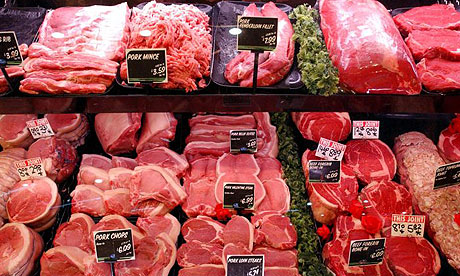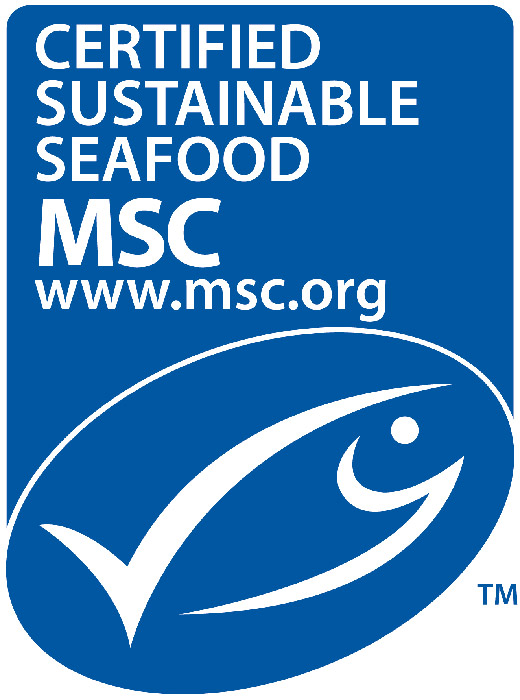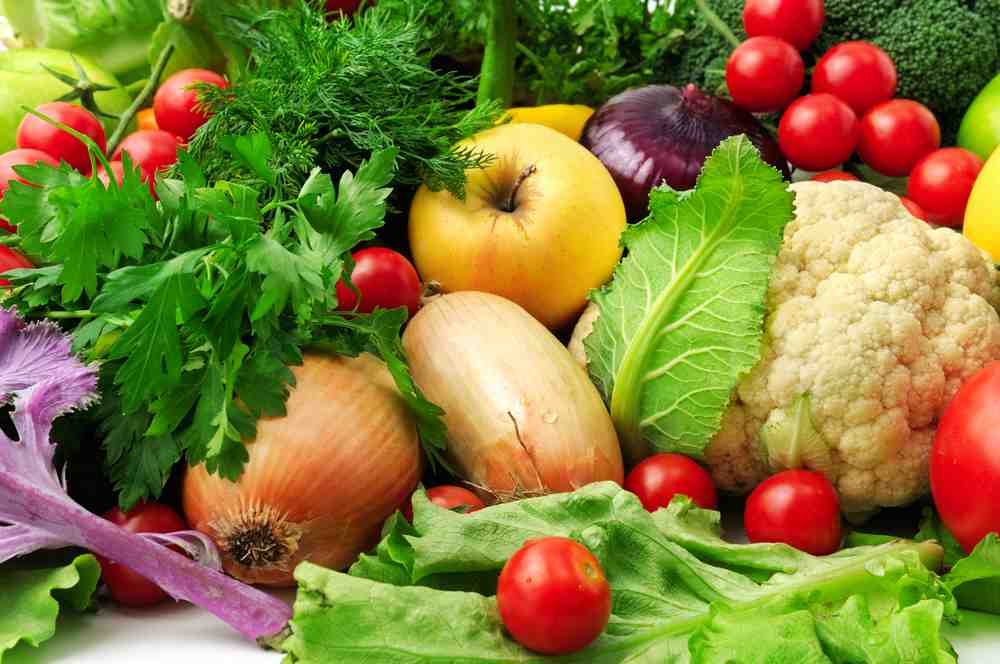In the UK some 860 million animals are reared every year for the food industry. It's our favourite source of protein. The average meat-eater will consume 760 chickens, 20 pigs, 29 sheep, 5 cows and half a trawler net full of fish in their lifetime.
 |
| image from theguardian.com |
There are a couple of ethical issues to consider. Meat production has become more intensive, which means that on the plus side, meat has come down in price, but on the negative side, means that animals are often suffering as a result, either through over-crowding, lack of proper attention to health and well being and lengthy transportation of live animals. In addition, in order to farm intensively, animals are often kept in unnatural environments, given hormones to reproduce more than they would naturally, given antibiotics to prevent illness rather than treat it. Intensive meat farming where far more animals are stocked in a smaller area can also lead to agricultural pollution as waste runs off the farm and into water courses. Reliance on commercial feed rather than grass to feed this large number of animals also leads to environmental and social problems elsewhere, with land used to grow food for animals, consuming both land and water that could have been used to grow food for humans - it takes 900 litres of water to grow 1kg of wheat, but 100,000 litres of water to raise 1kg of beef. A real strain on resources in a world where resources are far too scarce and too many people are dying through lack of food and water. The end product is often over packaged and is routinely injected with water (to increase the weight and price) and preservatives.
As an extra issue, meat is also high in saturated fat, so too much of it could be placing a strain on our bodies and therefore on our health services.

Fish stocks are in serious trouble. We are taking too many fish out and not leaving enough for them to be able to reproduce quickly enough to replenish their stocks. When we fish on a large scale, we also employ techniques which regularly decimate entire ecosystems, or inadvertently kill other species. To counter the over-fishing problem fishing quotas have been in place for years, which means that to feed the desire for fish (and for our own health we are being told that we should be eating more fish, aiming for at least two portions per week), we are increasingly turning to fish farms. Fish farms have their own ethical problems, as they routinely treat the fish with antibiotics, anti-parasite chemicals etc. Prawns are usually farmed in developing countries which often employ child or very cheap labour, coupled with dangerous working conditions using a range of toxic chemicals which are then routinely dumped in the sea.
 |
| image from the Vegetarian Society of Ireland |
The most obvious ethical choice would be becoming vegetarian, or better still vegan, avoiding propping up the meat industry entirely. Alternative sources of protein include quorn (a synthetic fungal protein) and soya or tofu (which has its own ethical issues such as deforestation to grow soya, and the use of genetically modified soya).
If giving up meat entirely is a step too far, then you could consider reserving meat for the weekends and special occasions. This would make it easier too to make other ethical choices (which may cost more) about the meat that we do consume:
- when buying any meat, opt for organic and free-range as it means that the animal will have been treated better, with lower stocking densities, access to feed outdoors etc. Look for the organic and RSPCA Freedom Food logos.
- buy meat from a local butcher who should be able to tell you the source and provenance of their product. It's also unlikely to be injected or tampered with (especially if you can see the butchery with your own eyes!) and over-packaged;
- buy lamb in the Summer. Lambs are born in the spring, so should be big enough to eat by early Summer. In order to have "Spring lamb" in the supermarkets in February the poor ewe is being given hormone treatments and often forced to give birth as many as three times during the year, or live lambs are being transported across the continent in dreadful conditions between where they were farmed and where they will be slaughtered, so they can be delivered to supermarkets as fresh as possible.
- Opt for line-caught or organic fish;
- choose pollock, or plentiful haddock, instead of cod. Check the Good Fish Guide, from the Marine Conservation Society, for a list of sustainable fish.
- Choose smaller cold-water Atlantic prawns rather than larger Tiger or King prawns (the ones farmed in developing countries).
And the Ink Spots household?
I'll be honest here. I like eating meat. I was a vegetarian for a while, as I didn't think I'd be able to kill an animal, and if I couldn't kill one myself, then it wasn't right to eat them. My husband (before he was my husband) defeated me with the logical argument: "well you can't do your own colonoscopy either, but if you needed one doing you'd get somebody else to do it for you." I started eating meat again with only a little guilt. I'm a sucker for a lovely bit of roast and a bacon sandwich.
However, for all the reasons above, I am trying to cut down on the meat a bit. I don't think that we'll be able to reserve it for the weekends, "you forgot to put any meat on my plate!", but I have been able to swap a meaty mid-week meal or few to things like jacket potato with cheese and beans or tuna, omelette, or pasta with a vegetable sauce. I'll keep gradually making these swaps until it becomes more of a habit for all of us.
I only buy free-range chicken, but need to make more of an effort to buy organic and free-range meat all the time, and use local butchers... which becomes easier and more affordable the less meat we eat.
I only buy pole and line caught tuna, but I do need to be more selective about the prawns I buy (I just love those juicy big ones - now I'm not so sure!) and make sure that I buy a range of fish from the sustainable list.
I guess the answer here is that while with fruit and veg I was doing okay but still had more to do, with meat and fish I am a long way from making the kind of ethically sound choices that I would wish for. Still, as I mentioned in my first post about ethical living, the choices we make towards an ethical life have to be made one at a time, small steps towards better habits. We're taking those steps, and knowing that we need to is a good start. I'll review how we're getting on as time goes by.
What about you? Do you buy sustainable fish? Organic meat? Have meat-free Mondays? Are you a vegetarian or vegan and wonder how I could touch a bacon sandwich? Are you trying to cut meat down in the diet of a carnivorous family member?

No comments:
Post a Comment